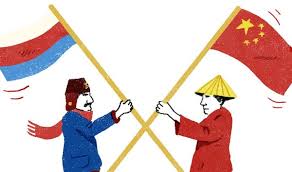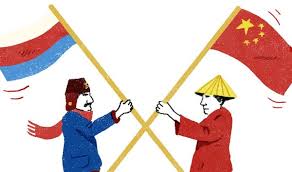
Amid mounting tensions on the Korean Peninsula and in the South China Sea, Russia offered support for China’s opposition to U.S. actions in two of Asia’s biggest security flash points.
The possible U.S. deployment of the Thaad anti-missile system in South Korea to defend against the growing North Korean nuclear threat was viewed as a source of "grave concern" by foreign ministers from China and Russia. China’s stance about non-claimants like the U.S. shouldn’t "interfere" in the territorial disputes in the South China Sea was also backed by China.
Russian Foreign Minister Sergei Lavrov said the two sides had a "unified position" on North Korea speaking at a joint press conference with his Chinese counterpart Wang Yi in Beijing on Friday. There were warnings issued by hhm against any attempts to use the nuclear threat "as a justification for building up military potential on the Korean Peninsula."
Tensions among the dominant powers in Asia have been fueled by the U.S.’s missile shield plan and its naval challenges to China’s claims to more than 80 percent of the South China Sea. The Terminal High Altitude Area Defense system could be used against its own weaponry, fears China. As it braces for a ruling by an international arbitration panel on a challenge to its claims by the Philippines, it has also been lobbying for international support for its position on the South China Sea.
After North Korea tested a fourth nuclear device on Jan. 6, followed by further missile tests, the U.S. and South Korea began talks on the possible deployment of the Thaad system. Wang said that the Thaad "exceeds the realistic defensive needs of the relevant countries".
"If it is deployed, it will have a direct impact on the Chinese and Russian strategic security," Wang added.
As the two countries prepare for a June summit between presidents Xi Jinping and Vladimir Putin, this was the second meeting between Chinese and Russian foreign ministers within two weeks. Both countries opposed "internationalizing" the South China Sea dispute, calling for settlements through negotiation and consultation among the "relevant parties," a diplomatic phrase Beijing uses to exclude non-claimants, Wang and Lavrov said in an April 18 meeting.
"Russia’s position is that it should not be an international issue and no external forces should interfere," Lavrov said at the briefing Friday.
As it builds a platform to assert its claims to more than 80 percent of the water, China has reclaimed more than 3,000 acres of land in the South China Sea over the past two years. In what it calls freedom-of-navigation operations, the U.S. has responded by sending warships near Chinese outposts.
Ahead of the ruling by the Permanent Court of Arbitration in The Hague, which is expected within weeks, there has been mounting tensions. Beijing insists all disputes should be resolved through bilateral talks and has rejected the court’s jurisdiction.
(Source: www.bloomberg.com)
The possible U.S. deployment of the Thaad anti-missile system in South Korea to defend against the growing North Korean nuclear threat was viewed as a source of "grave concern" by foreign ministers from China and Russia. China’s stance about non-claimants like the U.S. shouldn’t "interfere" in the territorial disputes in the South China Sea was also backed by China.
Russian Foreign Minister Sergei Lavrov said the two sides had a "unified position" on North Korea speaking at a joint press conference with his Chinese counterpart Wang Yi in Beijing on Friday. There were warnings issued by hhm against any attempts to use the nuclear threat "as a justification for building up military potential on the Korean Peninsula."
Tensions among the dominant powers in Asia have been fueled by the U.S.’s missile shield plan and its naval challenges to China’s claims to more than 80 percent of the South China Sea. The Terminal High Altitude Area Defense system could be used against its own weaponry, fears China. As it braces for a ruling by an international arbitration panel on a challenge to its claims by the Philippines, it has also been lobbying for international support for its position on the South China Sea.
After North Korea tested a fourth nuclear device on Jan. 6, followed by further missile tests, the U.S. and South Korea began talks on the possible deployment of the Thaad system. Wang said that the Thaad "exceeds the realistic defensive needs of the relevant countries".
"If it is deployed, it will have a direct impact on the Chinese and Russian strategic security," Wang added.
As the two countries prepare for a June summit between presidents Xi Jinping and Vladimir Putin, this was the second meeting between Chinese and Russian foreign ministers within two weeks. Both countries opposed "internationalizing" the South China Sea dispute, calling for settlements through negotiation and consultation among the "relevant parties," a diplomatic phrase Beijing uses to exclude non-claimants, Wang and Lavrov said in an April 18 meeting.
"Russia’s position is that it should not be an international issue and no external forces should interfere," Lavrov said at the briefing Friday.
As it builds a platform to assert its claims to more than 80 percent of the water, China has reclaimed more than 3,000 acres of land in the South China Sea over the past two years. In what it calls freedom-of-navigation operations, the U.S. has responded by sending warships near Chinese outposts.
Ahead of the ruling by the Permanent Court of Arbitration in The Hague, which is expected within weeks, there has been mounting tensions. Beijing insists all disputes should be resolved through bilateral talks and has rejected the court’s jurisdiction.
(Source: www.bloomberg.com)





